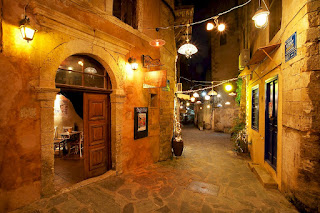City center
Although it was bombed and burned several times in its long history, the
old town of Chania is considered one of the most beautiful cities in the
Mediterranean. The traveler can wander through the
narrow alleys and in various places,he can meet examples of all the cultures
that passed through it.
In its center is the hill of
Kastelli, which has been inhabited since the Neolithic era and is a fortified
position next to the old port. In it there is the palace of the
High Commissioner of Crete during the period of the Cretan State, as well as
archaeological sites from the Minoan era. A little further east of Castelli is
Splangia, the old Muslim quarter, which is very atmospheric. In its
picturesque alleys there are many taverns. There is also the church of Agios
Nikolaos, which during the Venetian rule was the church of Agios Nikolaos of
the Dominicans and during the Turkish rule it was the central mosque of Chania,
while it has been operating as an Orthodox church since 1918. Outside the
church is Splantzia Square with the plane tree on which the Turks
hanged the bishop of Kisamos, Melchizedek Despotakis, and the deacon Kallinikos
from Veroia. At the corner of the square is the Venetian church of Agios Roccos. In the same area
are the small churches of Agia Irini (Sarpakis Street) and of Saints Catherine
and John the Hermit (Melidoni Street).
Walking towards the sea we see the Venetian neoria (from 1497), the Carnaia,
which once built war galleys, today they still operate repairing boats. There,
one will also see the great Arsenal, which housed the Chania town hall until it
was bombed by the Germans in 1941, which today houses the Center for
Mediterranean Architecture. At the eastern tip of the Venetian
Harbor is Neorio Moro, which today houses the Chania Sailing. This district,
together with Ovraiki (or Jewish), are considered the most beautiful districts
of Chania. In it is also the Venetian fortress of Fırka (Turkish Fırka - Division,
in Venetian Revellino di Porto), where the union flag of Crete with Greece was
raised (1-12-1913) and today the Maritime Museum of Crete operates.
Finally, the port of the old town
is the most beautiful and touristic spot of Chania! The Tombazi coast,
the Kountouriotis coast and the Union coast with several historical buildings,
such as the Νeoria, the Yalı camisi (The mosque on the
shore) and the great Arsenal, which today houses the center of Mediterranean
architecture.
The center of the old town is the Fountain, where the main streets of the
old city, Halidon Street, Canevaro Street and Zambeliou Street, intersect. On Zambeliou
Street is one of the most beautiful examples of a Venetian mansion in the city,
the abusively called Loggia of the Venetians, preserving a coat of arms, a
Latin saying and almost all the architectural elements of the facade. The
identification of the coat of arms allowed the identification of the individual
(Nicolo Clado) and the dating (1615-1625) of the mansion.
Across the coast one can admire the 19th century Egyptian lighthouse,
built on the foundations of the older Venetian lighthouse, which is the city's
trademark.
Montern city
A little further
south from the Trimartyri square is the New Shops square, which is the boundary
of the new city. The official name of the square is
Square 1866, was named in honor of the great Cretan revolution (1866-1869)
against the Turks. The town's shops have been located
there since the beginning of the 20th century. Today one can find many quaint shops
and cafes. There are also intercity bus stations.


